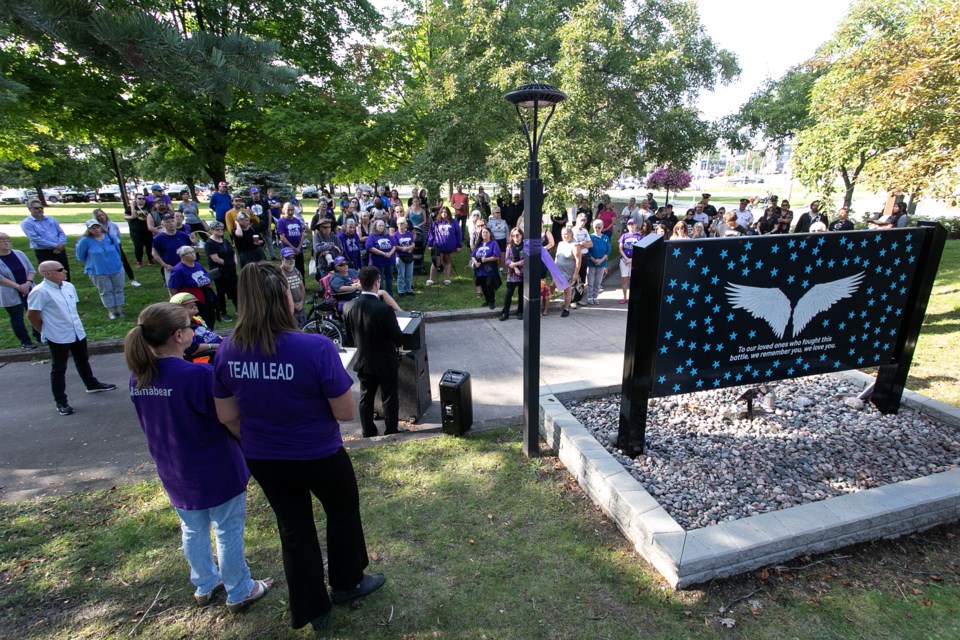SooToday received the following letter to the editor in response to our story: Hope and remembrance as Overdose Awareness Day is marked in the Sault.
Having read an article this weekend on the opioid crisis in Sault Ste. Marie, I felt compelled to write a letter. Mayor Shoemaker himself stated: "We have higher than provincial average rates of opioid-related emergency department visits, opioid-related hospitalizations, and unfortunately opioid-related deaths."
Mental health and substance issues do not discriminate. They affect people from all over the world, from different socioeconomic backgrounds, and with a myriad of traumatic experiences. There is a tendency to devalue their experience and judge disenfranchised people when there is a universal addiction process. It is not rocket science — people use addictions to escape and numb their pain. Pain is inevitable, has a purpose, and is relative to the interpretation of a traumatic experience.
You can judge a culture by the extent to which it honours or disregards essential human needs. Sault Ste. Marie is blatantly disregarding essential human needs, such as affordable housing, accessible quality mental health and addiction treatment services, and human connection.
The environment is problematic, thus problematic behaviours manifest. Revitalization and beautification downtown were never the answer. The solutions to the problems in the community do not lie in economic development and incarceration.
The rate of recidivism is astronomical in the city because a full continuum of care does not exist. Sure, the methadone clinic is crucial, but where are the adjunct residential, intensive outpatient, and partial hospitalization programs?
Comprehensive treatment and rehabilitative options need to exist for the city to lower crime rates and recidivism, keep children safe, and mitigate adverse childhood experiences, disrupting cycles of abuse and inter-generational trauma, things proven to increase the risk of mental health issues and addiction.
This is not a moral issue, and until it happens to your family, as it has in mine, you cannot begin to understand the depth of pain and the impact it has. This issue is not new; it has just been made more visible.
As the Sault has grown, infrastructure and supportive services have not developed to meet the complexities of contemporary social issues and essential human needs. The current approach to these issues disregards the needs of children and adults. To that end, when those needs are not met, people will adopt personality traits, not deliberately or consciously manipulative, but as an automatic response to cope and survive. This is evidenced in the prevalence of criminal behaviour in the city.
Addiction is not a conscious choice, and we need a drastic change in narrative paradigm shift. While the legal system is based on a falsehood, that addiction is a choice, which is a belief that many people in the city prescribe to.
It is not a genetic disease or a brain disease — it is an adaptation and a coping response to unbearable pain. The pain is relative and not open for judgment or comparison by onlookers.
We hear that all the time and see it written in disgusting posts on "Keeping the Soo Safe" and other abhorrent Facebook pages, hell-bent on shaming and kicking people when they are down.
I am willing to guess many of the armchair quarterbacks making disparaging comments have a more palatable and socially acceptable addiction.
Addiction is an attempt to solve a problem and is manifested in any behaviour that a person finds short-term pleasure in. It is not limited to drugs and alcohol — it can also be food, gaming, shopping, gambling, pornography, sex, or even tumult.
The community needs to stop ostracizing people and sending messages of rejection to people experiencing substance abuse and mental health issues.
The gist is people are acting out their trauma, and the city needs more supportive services and facilities.
Most importantly, it needs more compassion and a deeper understanding.
Brooke Smith Harper
